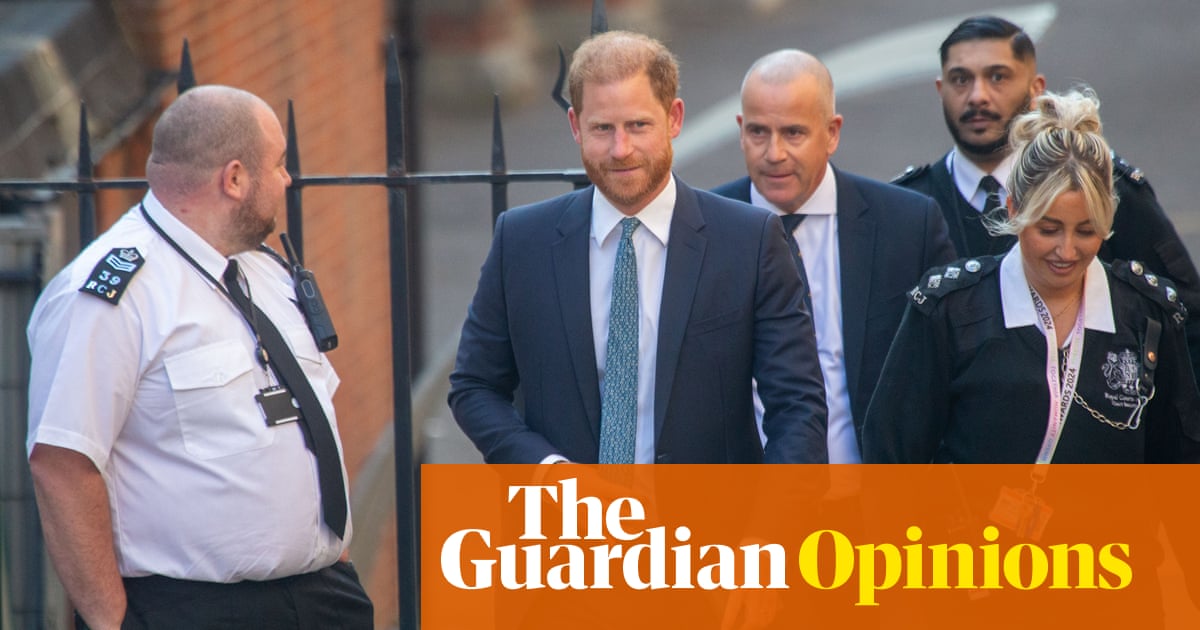Prince Harry wanted a completely new life and he has got one. He is no longer a working royal, but a rich person. His Rich Highness. This involves a change of mindset in a mind that is somewhat hard to describe as quick on the uptake.
Being rich is all well and good, of course, and the duke certainly moaned enough about money when he was still within the confines of royal duty, to hear insiders tell it. But the reason you don’t see Beyoncé out there on the talkshow circuit whining about how much money she has to spend on security – easily eight figures a year – is that she, a very rich person, seems to understand that regrettably it goes with the territory, and that you have to pay for it out of your riches.
Next week, Kim Kardashian is expected to take the stand in the Paris trial of the robbers who tied her up and subjected her to a truly horrific ordealwhen she was staying in the city in 2016. At no point during her examination is she expected to say that François Hollande, who was president at the time, should have intervened via the workings of the state to provide security. (Or to stop herbodyguard going out to a nightclub with Kourtney and Kendall, let’s face it.)
As well as beingbiologically unable to sweat, Prince Andrew had this weird condition where he couldn’t have a listen to himself, and you do worry Prince Harry has inherited the same gene. On Friday, in the wake oflosing his legal challengeover taxpayer-funded police security when in the UK,Harry gave an interview to the BBC. It took place in another one of thoserandom spare Montecito mansionshe and Meghan seem to borrow when they want to demand foreign taxpayer cash/make televised pasta for an obsequiously grateful hairstylist.
Alas, in its attempts to make his own behavioural choices seem like victimhood, this interview was almost Trumpian – although without that master communicator’s ability to stick the landing. Alleging “establishment” conspiracy, playing the victim of his own decisions, saying the quiet bit out loud about how the law of the land should just do what his family wants … If you were playing bullshit bingo you’d have got a full house in seconds.
Perhaps one of his many very rich friends could give him a primer on what being a very rich person involves? Rich people who have earned their own money understand that publicly gnashing their teeth about the cost of security is the quickest route to ridicule and contempt from a public that has infinitely less than them. Doing it for broadcast in a country the day after local elections where the most toxic issue on the doorstep wasmeans-testing the winter fuel allowance… well, have a listen to yourself, Harry Antoinette.
Or indeed a read of the comments below the video in the various media outlets in which it has since been shared. As an enthusiastic adopter and scatterer of labels and pop psychology in recent years, Harry may be confused to find the same now being applied to him. You can’t move for people saying “this is what narcissistic injury looks like”, or accusing him of “victim blaming” his family, or calling him a “nepo baby”. Weirdly, nepo baby is not one he heard when he was in the royal family – quite amusingly, given that’s literally the entire point. See also “entitled” and “privileged”. He seems not to have clocked on to the fact people have had enough of the holier-than-thou act. Perhaps he needs unconscious pious training.
Either way, Harry’s a rich person now, and the rules are different. Again, could someone get him up to speed? That said, if they do, it will come too late to have headed off some of his more eye-popping etiquette breaches in the society he has chosen. As far back as theOprah interview, Harry was already pissing on his new employers, explaining of his mega-money deals with Netflix ($100m) and Spotify ($20m): “That was suggested by somebody else by the point of where my family literally cut me off financially, and I had to afford security for us.”
Oof. I bet Netflix and Spotify executives loved that explanation from the talent. This is like burning your bridge, then someone building you a new $120m bridge, and you deciding to burn that one down too because you’re too stupid and rude to understand how to behave. Again, you don’t see a whole load of rich celebrities kicking back on the talkshow sofas and honking: “I literally did this movie because my agent told me I had to do it to pay for my dinosaur bones acquisition habit.” (Even though I suspect that has actually been the case for a number ofNicolas Cage projects.) Perhaps this is why Spotify’s head of podcast innovation and monetisation came todescribe Harry and Meghan as “grifters”after their deal came to an end, with the Sussexes having served up precisely 12 episodes of a single podcast series that was not even in the same zip code as a hit, whatever Spotify’s kindly in-house charts might have suggested.
Arguably the most bizarre irony of all is Harry’s ongoing insistence on melting down in the media. If he detests the media so much, he could always stop making them money by conducting his private business in public, driving traffic and engagement for those he considers his sworn enemies. Unless provoking another row that could be lucratively explored in documentary form is covertly the whole point? In which case, perhaps he’s cottoning on to a life in business after all.
Marina Hyde is a Guardian columnist
Do you have an opinion on the issues raised in this article? If you would like to submit a response of up to 300 words by email to be considered for publication in ourletterssection, pleaseclick here.
